《给一个青年诗人的十封信》
给一个青年诗人的十封信读后感(精选5篇)
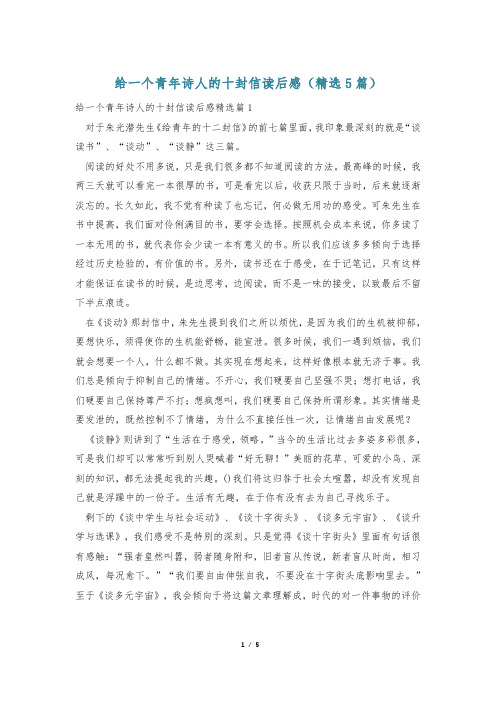
给一个青年诗人的十封信读后感(精选5篇)给一个青年诗人的十封信读后感精选篇1对于朱光潜先生《给青年的十二封信》的前七篇里面,我印象最深刻的就是“谈读书”、“谈动”、“谈静”这三篇。
阅读的好处不用多说,只是我们很多都不知道阅读的方法。
最高峰的时候,我两三天就可以看完一本很厚的书,可是看完以后,收获只限于当时,后来就逐渐淡忘的。
长久如此,我不觉有种读了也忘记,何必做无用功的感受。
可朱先生在书中提高,我们面对伶俐满目的书,要学会选择。
按照机会成本来说,你多读了一本无用的书,就代表你会少读一本有意义的书。
所以我们应该多多倾向于选择经过历史检验的,有价值的书。
另外,读书还在于感受,在于记笔记,只有这样才能保证在读书的时候,是边思考,边阅读,而不是一味的接受,以致最后不留下半点痕迹。
在《谈动》那封信中,朱先生提到我们之所以烦忧,是因为我们的生机被抑郁,要想快乐,须得使你的生机能舒畅,能宣泄。
很多时候,我们一遇到烦恼,我们就会想要一个人,什么都不做。
其实现在想起来,这样好像根本就无济于事。
我们总是倾向于抑制自己的情绪。
不开心,我们硬要自己坚强不哭;想打电话,我们硬要自己保持尊严不打;想疯想叫,我们硬要自己保持所谓形象。
其实情绪是要发泄的,既然控制不了情绪,为什么不直接任性一次,让情绪自由发展呢?《谈静》则讲到了“生活在于感受,领略。
”当今的生活比过去多姿多彩很多,可是我们却可以常常听到别人哭喊着“好无聊!”美丽的花草、可爱的小鸟、深刻的知识,都无法提起我的兴趣。
()我们将这归咎于社会太喧嚣,却没有发现自己就是浮躁中的一份子。
生活有无趣,在于你有没有去为自己寻找乐子。
剩下的《谈中学生与社会运动》、《谈十字街头》、《谈多元宇宙》、《谈升学与选课》,我们感受不是特别的深刻。
只是觉得《谈十字街头》里面有句话很有感触:“强者皇然叫嚣,弱者随身附和,旧者盲从传说,新者盲从时尚,相习成风,每况愈下。
”“我们要自由伸张自我,不要没在十字街头底影响里去。
说寂寞——读读里尔克的《给一个青年诗人的十封信》
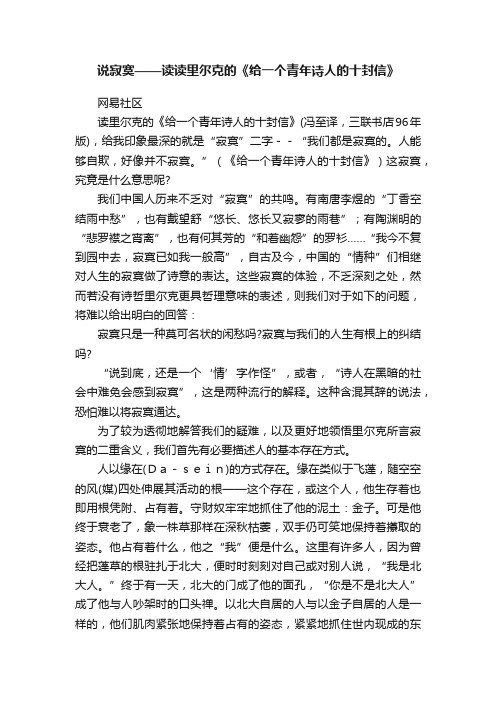
说寂寞——读读里尔克的《给一个青年诗人的十封信》网易社区读里尔克的《给一个青年诗人的十封信》(冯至译,三联书店96年版),给我印象最深的就是“寂寞”二字--“我们都是寂寞的。
人能够自欺,好像并不寂寞。
”(《给一个青年诗人的十封信》)这寂寞,究竟是什么意思呢?我们中国人历来不乏对“寂寞”的共鸣。
有南唐李煜的“丁香空结雨中愁”,也有戴望舒“悠长、悠长又寂寥的雨巷”;有陶渊明的“悲罗襟之宵离”,也有何其芳的“和着幽怨”的罗衫……“我今不复到园中去,寂寞已如我一般高”,自古及今,中国的“情种”们相继对人生的寂寞做了诗意的表达。
这些寂寞的体验,不乏深刻之处,然而若没有诗哲里尔克更具哲理意味的表述,则我们对于如下的问题,将难以给出明白的回答:寂寞只是一种莫可名状的闲愁吗?寂寞与我们的人生有根上的纠结吗?“说到底,还是一个‘情’字作怪”,或者,“诗人在黑暗的社会中难免会感到寂寞”,这是两种流行的解释。
这种含混其辞的说法,恐怕难以将寂寞通达。
为了较为透彻地解答我们的疑难,以及更好地领悟里尔克所言寂寞的二重含义,我们首先有必要描述人的基本存在方式。
人以缘在(Da-sein)的方式存在。
缘在类似于飞蓬,随空空的风(媒)四处伸展其活动的根——这个存在,或这个人,他生存着也即用根凭附、占有着。
守财奴牢牢地抓住了他的泥土:金子。
可是他终于衰老了,象一株草那样在深秋枯萎,双手仍可笑地保持着攥取的姿态。
他占有着什么,他之“我”便是什么。
这里有许多人,因为曾经把蓬草的根驻扎于北大,便时时刻刻对自己或对别人说,“我是北大人。
”终于有一天,北大的门成了他的面孔,“你是不是北大人”成了他与人吵架时的口头禅。
以北大自居的人与以金子自居的人是一样的,他们肌肉紧张地保持着占有的姿态,紧紧地抓住世内现成的东西,不管这现成的东西是肉眼可见的钱币、还是无形的北大身份,他们都当成是石头一般坚硬的对象去把捉。
奈何生命本身是流动的,水与石头无法融合,因此他们不得不花费大的气力才能抓住“对象”,不得不编造种种的谎来搪塞、安慰自己。
公选作业读《给一个青年诗人的十封信》有感
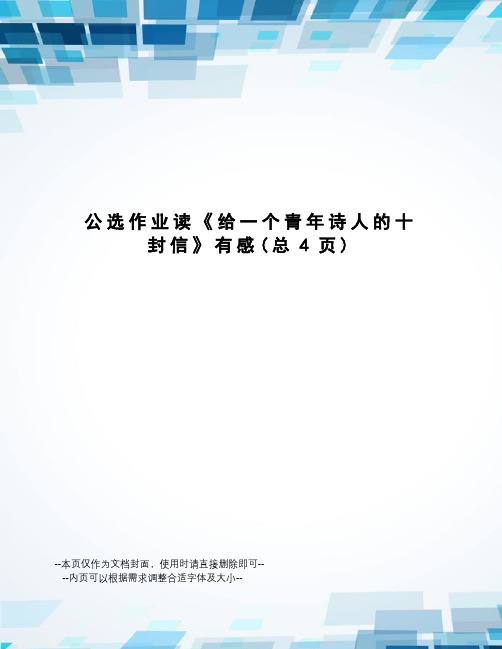
公选作业读《给一个青年诗人的十封信》有感(总4页)--本页仅作为文档封面,使用时请直接删除即可----内页可以根据需求调整合适字体及大小--读《一个青年诗人的十封信》有感15级平面1班思宏基()初读本书,是在公选老师的推荐下,于是,我在网络上开始读这本书,可是当我读到第三封信的时候,便决定去图书馆借来实体书阅读,因为我觉得,读一本好的书籍,应该正襟危坐,泡上一壶好茶,然后捧着手中的书本细细品味,茶香加上书香,每每读到高兴处,品一口茶,那时的茶是香甜的,每每读到沉思痛苦处,品茶一口,这时的茶便是人生的苦涩。
电子书固然很方便阅读,但读电子书时你是绝对没有读实体书的那种心境的。
电子书就像快餐一样,读过了也就完了,你的思维是没有如此多的感想的。
所以,在学校图书馆借到这本书开始,我的思维才开始在书中遨游起航。
古人说过“书中自有颜如玉,书中自由黄金屋。
”读一本好书是能使人明白诸多道理,学到许多东西的。
当我泡好一壶滇红,捧起手中的《给一个青年诗人的十封信》品味,品茶也品书,我从滇红喝到了普洱,再从普洱喝到凤庆古树茶,再从古树茶喝回到滇红,我终于读完了全书最后一页,轻轻合上书的那一瞬间,我的思维犹如万匹脱缰的野马,是的,书终于读完了,但是,我却无法用语言和文字来表达我的感受,我认为人在情绪波动很大的时候是没有一种语言和文字能全面的表达出他的感受的。
我在心中静静冥想着,突然想到一句佛语“不可云。
”当然,我肯定对有所“悟”的,于是,我开始平静自己的心,用我这并不文艺的手法开始书写着并不能完全表达表达我心感受的文字。
在此书中,我印象最为深刻的莫过于里尔克的走向内心,居于寂寞的的观点,像木头似的等待成熟,在寂寞中起始练习将来许多人或能做到的事情,聚集全部的痛苦和向上激动的心去为那最后最高最艰难的工作做准备,把命运纳入自身后等待它,然后它如何从我们的生命中出现向别人走进,期待一个神如同期待那最后的完成。
居于寂寞的,写作与寂寞为伴而我们学习设计的,不也是居于寂寞吗“没有人能给你出主意,没有人能够帮助你,只有一个唯一的方法。
给一个青年诗人的十封信

一个个的人在世上好似园里的那些并排着的树。枝枝叶叶也许有些呼应吧,但是它们的根,它们盘结在地下 摄取营养的根却各不相干,又沉静,又孤单。人每每为了无谓的喧嚣,忘却生命的根蒂,不能在寂寞中、在对于 草木鸟兽(它们和我们一样都是生物)的观察中体验一些生的意义,只在人生的表面永远往下滑过去。
目录分析
收信人引言
重印前言
第一封信
01
第二封信
02
第三封信
03
第四封信
04
第五封信
06
第七封信
05
第六封信
01
第八封信
02
第九封信
03
第十封信
04
附录一冯至 译里尔克作 品
06
附录三冯至 论里尔克
05
附录二相关 信件
作者介绍
这是《给一个青年诗人的十封信》的读书笔记模板,暂无该书作者的介绍。
谢谢观看
是朋友给懋懋的胎教书十封信看看很快里尔克很真诚完全没有架子看的时候一直有写信给朋友的冲动印象最 深的是那句“诗不是情感,是经验”。
好好忍耐,不要沮丧,如果春天要来,大地就使它一点一点完成,我们所做的少量的工作,不会比大地之于 春天更为艰难。
关于观看万物,艺术家“模制一件物,就是要:各处都看到了,无所隐瞒,无所忽略,毫无欺骗;认识一切 众多的侧面、一切从上看和从下看的观点、每个互相的交叉。
此书是认识里尔克以至于冯至的文学作品的存在主义特质的比较好的读物,同时也适合青年从存在主义和诗 意的角度认识自己。
精彩摘录
你向外看,是你现在最不应该做的事。没有人能给你出主意,没有人能够帮助你。只有一个唯一的方法。请 你走向内心。探索那叫你写的缘由,考察它的根是不是盘在你心的深处;你要坦白承认,万一你写不出来,是不 是必得因此而死去。
给一个青年诗人的十封信
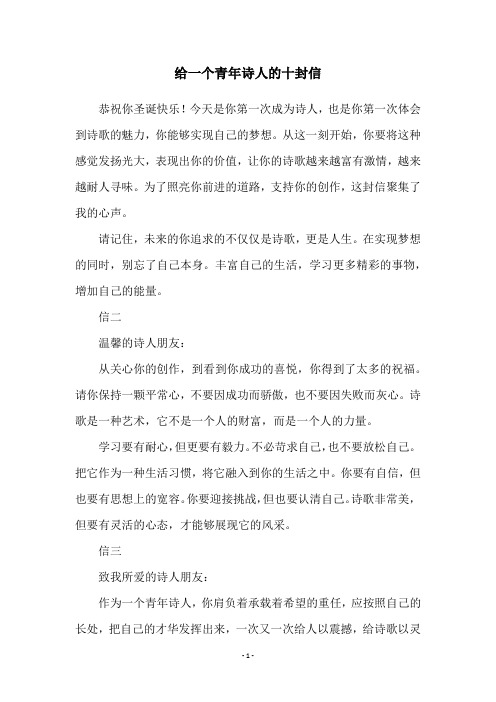
给一个青年诗人的十封信恭祝你圣诞快乐!今天是你第一次成为诗人,也是你第一次体会到诗歌的魅力,你能够实现自己的梦想。
从这一刻开始,你要将这种感觉发扬光大,表现出你的价值,让你的诗歌越来越富有激情,越来越耐人寻味。
为了照亮你前进的道路,支持你的创作,这封信聚集了我的心声。
请记住,未来的你追求的不仅仅是诗歌,更是人生。
在实现梦想的同时,别忘了自己本身。
丰富自己的生活,学习更多精彩的事物,增加自己的能量。
信二温馨的诗人朋友:从关心你的创作,到看到你成功的喜悦,你得到了太多的祝福。
请你保持一颗平常心,不要因成功而骄傲,也不要因失败而灰心。
诗歌是一种艺术,它不是一个人的财富,而是一个人的力量。
学习要有耐心,但更要有毅力。
不必苛求自己,也不要放松自己。
把它作为一种生活习惯,将它融入到你的生活之中。
你要有自信,但也要有思想上的宽容。
你要迎接挑战,但也要认清自己。
诗歌非常美,但要有灵活的心态,才能够展现它的风采。
信三致我所爱的诗人朋友:作为一个青年诗人,你肩负着承载着希望的重任,应按照自己的长处,把自己的才华发挥出来,一次又一次给人以震撼,给诗歌以灵魂,以激情。
要坚定自己的信念,追求自己,不要迎合流行,更不要把自己给局限在一个角落里。
要有勇气主动去改变状况,把不能改变的情况接受,把能够改变的事情去改变,用自信和勇气去实现自己的梦想。
信四尊敬的朋友:用一首诗歌来写诗,写出自己的心情。
让它宣传自己的理念,借助它来建立自我的形象,让自己不只是一个单调的声音,而更成为一种思想的代言人。
让自己思想成长,孜孜不倦;让自己心境更加宽容,让自己的诗歌能够聋哑人也能听懂。
做一个真正的诗人,不只是一个艺术家,更是一个践行者,只有站在时代的前沿,才能够把诗歌的精神发扬光大。
信五我的朋友:诗歌就像一颗明珠,在漫漫长路中为你照亮前行,让你永远有路可走。
未来的你要有心,坚持正道。
让自己的诗歌让更多的人认识你,也让自己认识更多的人。
不要忘记你的原则,而要继续努力,让自己的成果发挥出最大的作用。
里尔克给一个青年诗人的十封信

里尔克给一个青年诗人的十封信委内瑞拉伟大诗人西拉斯里尔克自1924年出生,至1969年过世之前,一生笔耕不辍,书写众多杰出的诗作,被誉为“拉丁美洲诗歌之父”。
他为期望发展的青年诗人写下了十封信,罗列其自身的经验和学习的教训,鼓舞后人继续他的遗志。
此篇文章将阐明西拉斯里尔克身为诗人的使命,以及他在十封信中赋予下一代的诗歌使命,以及如何把他的想法付诸行动,让他的遗志活着,让他的诗歌继续活跃于当今世界。
里尔克一生都在追求自己的使命,他把诗歌作为希望、觉醒和灵感,一步步朝着自己的梦想前进,在他看来,诗歌是一种声音,一种表达,一种象征,能够帮助人们应对困境,并寻求解脱,特别是在20世纪拉丁美洲社会变革和文化复兴的大背景下,里尔克认为诗歌是改变时代的一种力量。
他的诗作总是充满激情,充满活力,他的诗歌涉及的民族主义、反资本主义、百姓痛苦、自由、民主等话题,在他的作品中,有着对于生活的各种期待、思考和忧虑,他也说“当我开始用诗歌承载我的信仰,我便成了一名诗人”。
里尔克将自己的使命传递给下一代,他写下的十封信,字迹端端正正,每封信都有其独特的内容,但是大体上都在强调一些共同的观点,例如,里尔克认为诗人应当有正义感,坚持正义,把自己的文学作品视作一种武器,用诗歌的美丽、力量与众不同,立志于改变现实社会的丑陋现象,使人们觉醒;同时,里尔克也倡导青年诗人坚持自己的梦想,获取更多的知识,从实际出发,坚持打破常规,也就是他的名言:“要不断持续着,渴望不断着,爱的烈焰不断着,要把它告诉世界”。
他还建议青年诗人多多了解世界,不断努力,不被现实的苦涩所支配,与世界斗争抗争,与梦想相遇;最后,他还鼓励年轻人创造属于自己的诗歌形式,勇敢地表达自己的想法,把自己的血液和灵魂注入作品中,完成自己对世界的贡献。
里尔克对青年诗人的期望一直活跃于当今,他在十封信中所赋予的灵感与激励都成就了一批有才华的青年诗人,使他们的作品不断的出现在世界的文坛上。
给青年诗人的信
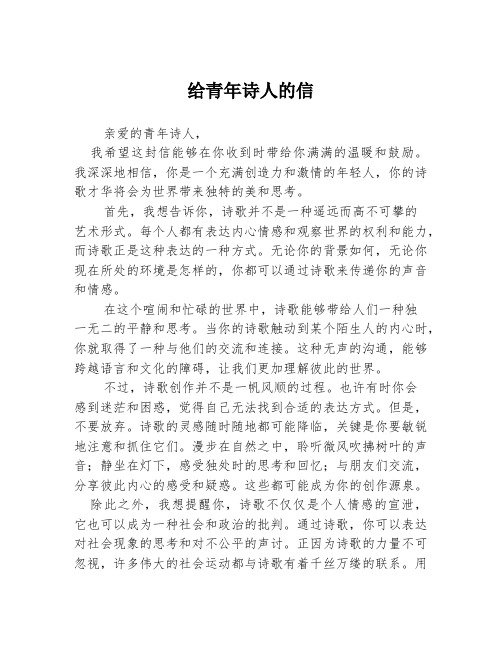
给青年诗人的信亲爱的青年诗人,我希望这封信能够在你收到时带给你满满的温暖和鼓励。
我深深地相信,你是一个充满创造力和激情的年轻人,你的诗歌才华将会为世界带来独特的美和思考。
首先,我想告诉你,诗歌并不是一种遥远而高不可攀的艺术形式。
每个人都有表达内心情感和观察世界的权利和能力,而诗歌正是这种表达的一种方式。
无论你的背景如何,无论你现在所处的环境是怎样的,你都可以通过诗歌来传递你的声音和情感。
在这个喧闹和忙碌的世界中,诗歌能够带给人们一种独一无二的平静和思考。
当你的诗歌触动到某个陌生人的内心时,你就取得了一种与他们的交流和连接。
这种无声的沟通,能够跨越语言和文化的障碍,让我们更加理解彼此的世界。
不过,诗歌创作并不是一帆风顺的过程。
也许有时你会感到迷茫和困惑,觉得自己无法找到合适的表达方式。
但是,不要放弃。
诗歌的灵感随时随地都可能降临,关键是你要敏锐地注意和抓住它们。
漫步在自然之中,聆听微风吹拂树叶的声音;静坐在灯下,感受独处时的思考和回忆;与朋友们交流,分享彼此内心的感受和疑惑。
这些都可能成为你的创作源泉。
除此之外,我想提醒你,诗歌不仅仅是个人情感的宣泄,它也可以成为一种社会和政治的批判。
通过诗歌,你可以表达对社会现象的思考和对不公平的声讨。
正因为诗歌的力量不可忽视,许多伟大的社会运动都与诗歌有着千丝万缕的联系。
用你的诗歌去挑战社会的不公和不合理,为正义和平等发声。
最后,我想告诉你,作为一名诗人,你将面临许多机会和挑战。
参加诗歌朗读会、写作工作坊、诗歌比赛等活动,你将能够结识更多志同道合的朋友,了解更多关于诗歌创作的技巧和经验。
同时,也要不断学习和发展自己的写作风格,保持对新事物的好奇心。
读书、旅行、观影,这些都能给你带来灵感和触动。
亲爱的青年诗人,你的诗歌是独一无二的,无论它们如何被世界接受,它们都是真实而有力的。
不要停止创作,不要气馁,相信自己的内心声音,让诗歌的力量融入你的生活和创作中。
无论是快乐还是悲伤,都可以借助诗歌来表达,让心灵得到释放。
致青年诗人的一封信
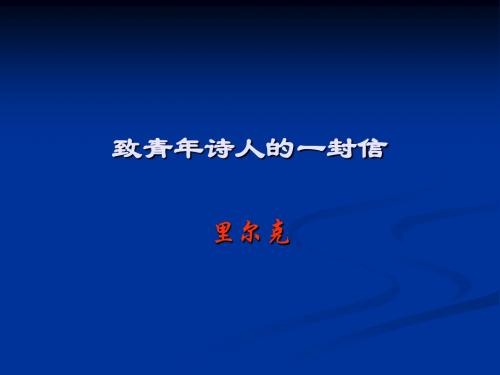
里尔克和他的女人们( 里尔克和他的女人们(二)
1906年 月保拉· 1906年5月保拉·贝克尔未完 成的里尔克肖像画。1907年 成的里尔克肖像画。1907年 11月20日,31岁 的保拉·贝克 11月20日,31岁 的保拉· 尔在生她唯一的一个孩子 时去世。保拉· 时去世。保拉·贝克尔是里 尔克夫人的闺中好友,据 传记介 绍也是里尔克的深 爱。
白日梦=精神胜利法? 白日梦=精神胜利法?
阿Q式的自我安慰 →小人物的悲哀 精神胜利法和白日梦一样,通过一种幻想的虚 构来达到一种精神上的平衡。 阿Q语录: 1、“我们先前——比你阔的多啦!你算是什么东 我们先前——比你阔的多啦!你算是什么东 西!” 西!” 2、阿Q站了一刻,心里想,“我总算被儿子打了, 、阿Q站了一刻,心里想,“ 现在的世界真不像样……”于是也心满意足的得胜 现在的世界真不像样……”于是也心满意足的得胜 的走了。 3、(阿Q)愤愤的躺下了,后来想:“现在的世界 、(阿Q)愤愤的躺下了,后来想:“ 太不成话,儿子打老子……”于是忽而想到赵太爷 太不成话,儿子打老子……”于是忽而想到赵太爷 的威风,而现在是他的儿子了,便自己也渐渐的 得意起来,……唱着《小孤孀上坟》 得意起来,……唱着《小孤孀上坟》到酒店去。
欲望压抑导致精神崩溃(一) 欲望压抑导致精神崩溃(
法国作家雨果的《 法国作家雨果的《巴 黎圣母院》 黎圣母院》中的禁欲 主义者克洛德主教由 主义者克洛德主教由 于过分压抑性本能而 导致精神极度扭曲变 形,后为了获得美丽 的吉普赛女郎埃斯米 拉尔达不择手段,最 终走向了自我毁灭的 道路。
欲望压抑导致精神崩溃(二) 欲望压抑导致精神崩溃(
弗洛伊德的文艺观
文学是性欲的升华
“力比多”的三种出路:一是通过正常的性 力比多” 行为得到宣泄;二是受到压抑而引起精神 病;三是转移和升华。创造文学艺术便是 这种活动之一。弗洛伊德认为,作家艺术 家都是性本能冲动异常强烈的人,他们通 过艺术创造的方式获得本能欲望的替代性 满足。 引申结论:不创作,毋宁死!
里尔克:《给青年诗人的十封信》:你要爱你的寂寞
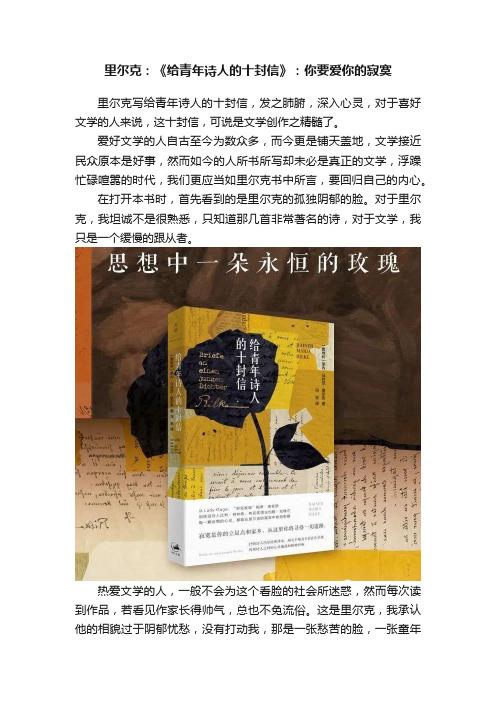
里尔克:《给青年诗人的十封信》:你要爱你的寂寞里尔克写给青年诗人的十封信,发之肺腑,深入心灵,对于喜好文学的人来说,这十封信,可说是文学创作之精髓了。
爱好文学的人自古至今为数众多,而今更是铺天盖地,文学接近民众原本是好事,然而如今的人所书所写却未必是真正的文学,浮躁忙碌喧嚣的时代,我们更应当如里尔克书中所言,要回归自己的内心。
在打开本书时,首先看到的是里尔克的孤独阴郁的脸。
对于里尔克,我坦诚不是很熟悉,只知道那几首非常著名的诗,对于文学,我只是一个缓慢的跟从者。
热爱文学的人,一般不会为这个看脸的社会所迷惑,然而每次读到作品,若看见作家长得帅气,总也不免流俗。
这是里尔克,我承认他的相貌过于阴郁忧愁,没有打动我,那是一张愁苦的脸,一张童年经历痛苦悲愁的脸。
于是先去了解他的生平。
果然如我所猜测,出生在平民家庭的他,父亲仕途不如意,脾气暴躁,母亲张扬虚荣整日幻想加入上流社会,在这样家庭中生活长大的里尔克自然谨小慎微,而姐姐一出生不久便夭折,母亲又把他当女孩来养,这样也使他的成长有了一些阴柔之气。
从他的脸上感到了深深的孤独。
可是孤独真的那么不讨人喜欢吗?“你要爱自己的寂寞,”在第四封信中,里尔克写给军官诗人,“你要负担起他,那以悠扬的怨诉给你引来的痛苦,当身边的人都同你疏远了,其实这就是你周围扩大的开始,因为你的矿源已经在星空下开展得很广大,你要以你的成长欢喜,可是向那里你不能带进来一个人”里尔克对于孤独是接受的,由此可见,我们知道诗人经历了怎样的心理变化。
如果排斥孤独,不接受生活送给自己的礼物,那么只会与生活格格不入,既然没办法选择生活,那么就去接受它,并好好的利用它,这就是里尔克的人生哲学,于是他把孤独变成了诗。
“要接受一切可能的生活,即使他令你不安,但那正是生活痛苦寂寞都是在生活接受它,把它变成实,即使没有朋友。
”这样的思想,也就是艺术文学创作者之所以能够在贫瘠的生活之上开出灿烂的文学之画的缘由。
里尔克对于创作的观点是要从日常生活中发事物去发现,让万物与心灵更贴近,要深幽寂静,谦虚真诚,假如你认为自己生活太贫乏,可是你还有回忆的宝库第一封信逝去的消沉了的动人的往事都可以为你提供丰富的写作素材,写诗要向内看,你的内心就是写作的源泉,这也是为什么写作的人要甘于寂寞的缘由。
里尔克给青年诗人的十封信第三封信
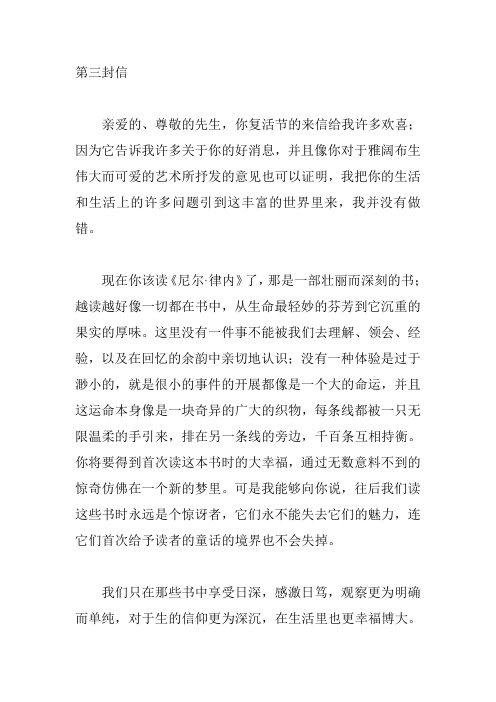
第三封信亲爱的、尊敬的先生,你复活节的来信给我许多欢喜;因为它告诉我许多关于你的好消息,并且像你对于雅阔布生伟大而可爱的艺术所抒发的意见也可以证明,我把你的生活和生活上的许多问题引到这丰富的世界里来,我并没有做错。
现在你该读《尼尔·律内》了,那是一部壮丽而深刻的书;越读越好像一切都在书中,从生命最轻妙的芬芳到它沉重的果实的厚味。
这里没有一件事不能被我们去理解、领会、经验,以及在回忆的余韵中亲切地认识;没有一种体验是过于渺小的,就是很小的事件的开展都像是一个大的命运,并且这运命本身像是一块奇异的广大的织物,每条线都被一只无限温柔的手引来,排在另一条线的旁边,千百条互相持衡。
你将要得到首次读这本书时的大幸福,通过无数意料不到的惊奇仿佛在一个新的梦里。
可是我能够向你说,往后我们读这些书时永远是个惊讶者,它们永不能失去它们的魅力,连它们首次给予读者的童话的境界也不会失掉。
我们只在那些书中享受日深,感激日笃,观察更为明确而单纯,对于生的信仰更为深沉,在生活里也更幸福博大。
——往后你要读那部叙述马丽·葛鲁伯夫人的运命与渴望的奇书,还有雅阔布生的信札、日记、片断,最后还有他的诗(纵使是平庸的德文翻译),也自有不能磨灭的声韵(这时我要劝告你,遇机会时可以去买一部雅阔布生的全集,一切都在里边。
共三册,译文很好,莱比锡外根·笛得利许Eugen Diederichs书店出版,每册据我所知只卖五六个马克)。
关于那篇非常细腻而精练的短篇小说《这里该有蔷薇……》,你对于作序者不同的意见实在很对。
顺便我劝你尽可能少读审美批评的文字,——它们多半是一偏之见,已经枯僵在没有生命的硬化中,毫无意义;不然就是乖巧的卖弄笔墨,今天这派得势,明天又是相反的那派。
艺术品都是源于无穷的寂寞,没有比批评更难望其边际的了。
只有爱能够理解它们,把住它们,认识它们的价值。
——面对每个这样的说明、评论或导言,你要想念你自己和你的感觉;万一你错误了,你内在的生命自然的成长会慢慢地随时使你认识你的错误,把你引到另外一条路上。
Letters to a young poet English Version给一个青年诗人的十封信英文版
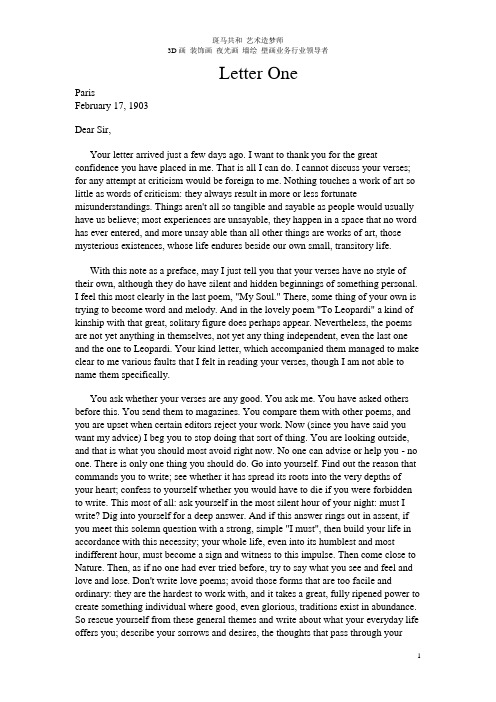
Letter OneParisFebruary 17, 1903Dear Sir,Your letter arrived just a few days ago. I want to thank you for the great confidence you have placed in me. That is all I can do. I cannot discuss your verses; for any attempt at criticism would be foreign to me. Nothing touches a work of art so little as words of criticism: they always result in more or less fortunate misunderstandings. Things aren't all so tangible and sayable as people would usually have us believe; most experiences are unsayable, they happen in a space that no word has ever entered, and more unsay able than all other things are works of art, those mysterious existences, whose life endures beside our own small, transitory life.With this note as a preface, may I just tell you that your verses have no style of their own, although they do have silent and hidden beginnings of something personal.I feel this most clearly in the last poem, "My Soul." There, some thing of your own is trying to become word and melody. And in the lovely poem "To Leopardi" a kind of kinship with that great, solitary figure does perhaps appear. Nevertheless, the poems are not yet anything in themselves, not yet any thing independent, even the last one and the one to Leopardi. Your kind letter, which accompanied them managed to make clear to me various faults that I felt in reading your verses, though I am not able to name them specifically.You ask whether your verses are any good. You ask me. You have asked others before this. You send them to magazines. You compare them with other poems, and you are upset when certain editors reject your work. Now (since you have said you want my advice) I beg you to stop doing that sort of thing. You are looking outside, and that is what you should most avoid right now. No one can advise or help you - no one. There is only one thing you should do. Go into yourself. Find out the reason that commands you to write; see whether it has spread its roots into the very depths of your heart; confess to yourself whether you would have to die if you were forbidden to write. This most of all: ask yourself in the most silent hour of your night: must I write? Dig into yourself for a deep answer. And if this answer rings out in assent, if you meet this solemn question with a strong, simple "I must", then build your life in accordance with this necessity; your whole life, even into its humblest and most indifferent hour, must become a sign and witness to this impulse. Then come close to Nature. Then, as if no one had ever tried before, try to say what you see and feel and love and lose. Don't write love poems; avoid those forms that are too facile and ordinary: they are the hardest to work with, and it takes a great, fully ripened power to create something individual where good, even glorious, traditions exist in abundance. So rescue yourself from these general themes and write about what your everyday life offers you; describe your sorrows and desires, the thoughts that pass through yourmind and your belief in some kind of beauty Describe all these with heartfelt, silent, humble sincerity and, when you express yourself, use the Things around you, the images from your dreams, and the objects that you remember. If your everyday life seems poor, don't blame it; blame yourself; admit to yourself that you are not enough of a poet to call forth its riches; because for the creator there is no poverty and no poor, indifferent place. And even if you found yourself in some prison, whose walls let in none of the world's sound - wouldn't you still have your childhood, that jewel beyond all price, that treasure house of memories? Turn your attention to it. Try to raise up the sunken feelings of this enormous past; your personality will grow stronger, your solitude will expand and become a place where you can live in the twilight, where the noise of other people passes by, far in the distance. And if out of , this turning within, out of this immersion in your own world, poems come, then you will not think of asking anyone whether they are good or not. Nor will you try to interest magazines in these works: for you will see them as your dear natural possession, a piece of your life, a voice from it. A work of art is good if it has arisen out of necessity. That is the only way one can judge it. So, dear Sir, I can't give you any advice but this: to go into yourself and see how deep the place is from which your life flows; at its source you will find the answer to, the question of whether you must create. Accept that answer, just as it is given to you, without trying to interpret it. Perhaps you will discover that you are called to be an artist. Then take that destiny upon yourself, and bear it, its burden and its greatness, without ever asking what reward might come from outside. For the creator must be a world for himself and must find everything in himself and in Nature, to whom his whole life is devoted.But after this descent into yourself and into your solitude, perhaps you will haveto renounce becoming a poet (if, as I have said, one feels one could live without writing, then one shouldn't write at all). Nevertheless, even then, this self searching that I ask of you will not have been for nothing. Your life will still find its own paths from there, and that they may be good, rich, and wide is what I wish for you, more than I can say.What else can I tell you? It seems to me that everything has its proper emphasis; and finally I want to add just one more bit of advice: to keep growing, silently and earnestly, through your whole development; you couldn't disturb it any more violently than by looking outside and waiting for outside answers to questions that only your innermost feeling, in your quietest hour, can perhaps answer.It was a pleasure for me to find in your letter the name of Professor Horacek; I have great reverence for that kind, learned man, and a gratitude that has lasted through the years. Will you please tell him how I feel; it is very good of him to still think of me, and I appreciate it.The poem that you entrusted me with, I am sending back to you. And I thank you once more for your questions and sincere trust, of which, by answering as honestly as I can, I have tried to make myself a little worthier than I, as a stranger, really am.Yours very truly,Rainer Maria RilkeLetter TwoViareggio, near Pisa (Italy)April 5, 1903You must pardon me, dear Sir, for waiting until today to gratefully remember your letter of February 24. I have been unwell all this time, not really sick, but oppressed by an influenza-like debility, which has made me incapable of doing anything. And finally, since it just didn't want to improve I came to this southern sea, whose beneficence helped me once before. But I am still not well, writing is difficult, and so you must accept these few lines instead of the letter I would have liked to send.Of course, you must know that every letter of yours will always give me pleasure, and you must be indulgent with the answer, which will perhaps often leave you empty-handed; for ultimately, and precisely in the deepest and most important matters, we are unspeakably alone; and many things must happen, many things must go right, a whole constellation of events must be fulfilled, for one human being to successfully advise or help another.Today I would like to tell you just two more things:Irony: Don't let yourself be controlled by it, especially during uncreative moments. When you are fully creative, try to use it, as one more way to take hold of fife. Used purely, it too is pure, and one needn't be ashamed of it; but if you feel yourself becoming too familiar with it, if you are afraid of this growing familiarity, then turn to great and serious objects, in front of which it becomes small and helpless. Search into the depths of Things: there, irony never descends and when you arrive at the edge of greatness, find out whether this way of perceiving the world arises from a necessity of your being. For under the influence of serious Things it will either fall away from you (if it is something accidental), or else (if it is really innate and belongs to you) it will grow strong, and become a serious tool and take its place among the instruments which you can form your art with.And the second thing I want to tell you today is this:Of all my books, I find only a few indispensable, and two of them are always with me, wherever I am. They are here, by my side: the Bible, and the books of the great Danish poet Jens Peter Jacobsen. Do you know his works? It is easy to find them, since some have been published in Recalm's Universal Library, in a very goodtranslation. Get the little volume of Six Stories by J. P. Jacobsen and his novel Niels Lyhne, and begin with the first story in the for mer, which is cared "Mogens." A whole world will envelop you, the happiness, the abundance, .the inconceivable vastness of a world. Live for a while in these books, learn from them what you feel is worth learning, but most of &U love them. This love will be returned to you thousands upon thousands of times, whatever your life may become - it will, I am sure, go through the whole fabric of your being, as one of the most important threads among all the threads of your experiences, disappointments, and joys.If I were to say who has given me the greatest experience of the essence of creativity, its depths and eternity, there are just two names would mention: Jacobsen, that great, great poet, and Auguste Rodin, the sculptor, who is without peer among all artists who are alive today.And all success upon your path!Yours,Rainer Maria RilkeLetter ThreeViareggio, near Pisa (Italy)April 23, 1903You gave me much pleasure, dear Sir, with your Easter letter; for it brought much good news of you, and the way you spoke about Jacobsen's great and beloved art showed me that I was not wrong to guide your fife and its many questions to this abundance.Now Niels Lyhne will open to you, a book of splendors and depths; the more often one reads it, the more everything seems to be contained within it, from life's most imperceptible fragrances to the full, enormous taste of its heaviest fruits. In it there is nothing that does not seem to have been understood, held, lived, and known in memory's wavering echo; no experience has been too unimportant, and the smallest event unfolds like a fate, and fate itself is like a wonderful, wide fabric in which every thread is guided by an infinitely tender hand and laid alongside another thread and is held and supported by a hundred others. You will experience the great happiness of reading this book for the first time, and will move through its numberless surprises as if you were in a new dream. But I can tell you that even later on one moves through these books, again and again, with the same astonishment and that they lose none oftheir wonderful power and relinquish none of the overwhelming enchantment that they had the first time one read them.One just comes to enjoy them more and more, becomes more and more grateful, and somehow better and simpler in one's vision, deeper in one's faith in life, happier and greater in the way one lives.And later on, you will have to read the wonderful book of the fate and yearning of Marie Grubbe, and Jacobsen's letters and journals and fragments, and finally his verses which (even if they are just moderately well translated) live in infinite sound. (For this reason I would advise you to buy, when you can, the lovely Complete Edition of Jacobsen's works, which contains all of these. It is in three volumes, well translated, published by Eugen Diederichs in Leipzig, and costs, I think, only five or six marks per volume.)In your opinion of "Roses should have been here . . ." (that work of such incomparable delicacy and form) you are of course quite, quite incontestably right, as against the man who wrote the introduction. But let me make this request right away: Read as little as possible of literary criticism. Such things are either partisan opinions, which have become petrified and meaningless, hardened and empty of life, or else they are clever word-games, in which one view wins , and tomorrow the opposite view. Works of art are of an infinite solitude, and no means of approach is so useless as criticism. Only love can touch and hold them and be fair to them. Always trust yourself and your own feeling, as opposed to argumentation, discussions, or introductions of that sort; if it turns out that you are wrong, then the natural growth of your inner life will eventually guide you to other insights. Allow your judgments their own silent, undisturbed development, which, like all progress, must come from deep within and cannot be forced or hastened. Everything is gestation and then birthing. To let each impression and each embryo of a feeling come to completion, entirely in itself, in the dark, in the unsayable, the unconscious, beyond the reach of one's own understanding, and with deep humility and patience to wait for the hour when a new clarity is born: this alone is what it means to live as an artist: in understanding as in creating.In this there is no measuring with time, a year doesn’t matter, and ten years are nothing. Being an artist means: not numbering and counting, but ripening like a tree, which doesn’t force its sap, and stands confidently in the storms of spring, not afraid that afterward summer may not come. It does come. But it comes only to those who are patient, who are there as if eternity lay before them, so unconcernedly silent and vast. I learn it every day of my life, learn it with pain I am grateful for: patience is everything!Richard Dehmel: My experience with his books (and also, incidentally, with the man, whom I know slightly) is that whenever I have discovered one of his beautiful pages, I am. always afraid that the next one will destroy the whole effect and changewhat is admirable into something unworthy. You have characterized him quite well with the phrase: "living and writing in heat." And in fact the artist's experience lies so unbelievably close to the sexual, to its pain and its pleasure, that the two phenomena are really just different forms of one and the same longing and bliss. And if instead of "heat" one could say "sex";- sex in the great, pure sense of the word, free of any sin attached to it by the Church, - then his art would be very great and infinitely important. His poetic power is great and as strong as a primal instinct; it has its own relentless rhythms in itself and explodes from him like a volcano.But this power does not always seem completely straightforward and without pose. (But that is one of the most difficult tests for the creator: he must always remain unconscious, unaware of his best virtues, if he doesn't want to rob them of their candor and innocence!) And then, when, thundering through his being, it arrives at the sexual, it finds someone who is not so pure as it needs him to be. Instead of a completely ripe and pure world of sexuality, it finds a. world that is not human enough, that is only male, is heat, thunder, and restlessness, and burdened with the old prejudice and arrogance with which the male has always disfigured and burdened love. Because he loves only as a male, and not as a human being, there is something narrow in his sexual feeling, something that seems wild, malicious, time-bound, uneternal, which diminishes his art and makes it ambiguous and doubtful. It is not immaculate, it is marked by time and by passion, and little of it will endure. (But most art is like that!) Even so, one can deeply enjoy what is great in it, only one must not get lost in it and become a hanger-on of Dehmel's world, which is so infinitely afraid, filled with adultery and confusion, and is far from the real fates, which make one suffer more than these time-bound afflictions do, but also give one more opportunity for greatness and more courage for eternity.Finally, as to my own books, I wish I could send you any of them that might give you pleasure. But I am very poor, and my books, as soon as they are published, no longer belong to me. I can’t even afford them myself and, as I would so often like to, give them to those who would be kind to them.So I am writing for you, on another slip of paper, the titles (and publishers) of my most recent books (the newest ones - all together I published perhaps 12 or 13), and must leave to you, dear Sir, to order one or two of them when you can.I am glad that my books will be in your hands.With best wishes,Yours,Rainer Maria RilkeLetter FourWorpswede, near BremenJuly 16, 1903About ten days ago I left Paris, tired and quite sick, and traveled to this great northern plain, whose vastness and silence and sky ought to make me well again. But I arrived during a long period of rain; this is the first day it has begun to let up over the restlessly blowing landscape, and I am taking advantage of this moment of brightness to greet you, dear Sir.My dear Mr. Kappus: I have left a letter from you unanswered for a long time; not because I had forgotten it - on the contrary: it is the kind that one reads again when one finds it among other letters, and I recognize you in it as if you were very near. Itis your letter of May second, and I am sure you remember it. As I read it now, in the great silence of these distances, I am touched by your beautiful anxiety about life, even more than when I was in Paris, where everything echoes and fades away differently because of the excessive noise that makes Things tremble. Here, where I am surrounded by an enormous landscape, which the winds move across as they come from the seas, here I feel that there is no one anywhere who can answer for you those questions and feelings which, in their depths, have a life of their own; for even the most articulate people are unable to help, since what words point to is so very delicate, is almost unsayable. But even so, I think that you will not have to remain without a solution if you trust in Things that are like the ones my eyes are now resting upon. If you trust in Nature, in what is simple in Nature, in the small Things that hardly anyone sees and that can so suddenly become huge, immeasurable; if you have this love for what is humble and try very simply, as someone who serves, to win the confidence of what seems poor: then everything will become easier for you, more coherent and somehow more reconciling, not in your conscious mind perhaps, which stays behind, astonished, but in your innermost awareness, awakeness, and knowledge. You are so young, so much before all beginning, and I would like to beg you, dear Sir, as well as I can, to have patience with everything unresolved in your heart and to tryto love the questions themselves as if they were locked rooms or books written in a very foreign language. Don't search for the answers, which could not be given to you now, because you would not be able to live them. And the point is, to live everything. Live the questions now. Perhaps then, someday far in the future, you will gradually, without even noticing it, live your way into the answer. Perhaps you do carry within you the possibility of creating and forming, as an especially blessed and pure way of living; train yourself for that but take whatever comes, with great trust, and as long as it comes out of your will, out of some need of your innermost self, then take it upon yourself, and don't hate anything. Sex is difficult; yes. But those tasks that have been entrusted to us are difficult; almost everything serious is difficult; and everything is serious. If you just recognize this and manage, out of yourself, out of your own talent and nature, out of your own experience and childhood and strength, to achieve awholly individual relation to sex (one that is not influenced by convention and custom), then you will no longer have to be afraid of losing yourself and becoming unworthy of your dearest possession.Bodily delight is a sensory experience, not any different from pure looking or the pure feeling with , which a beautiful fruit fills the tongue; it is a great, an infinite learning that is given to us, a knowledge of the world, the fullness and the splendor of all knowledge. And it is not our acceptance of it that is bad; what is bad is that most people misuse this learning and squander it and apply it as a stimulant on the tired places of their lives and as a distraction rather than as a way of gathering themselves for their highest moments. People have even made eating into something else: necessity on the one hand, excess on the other; have muddied the clarity of this need, and all the deep, simple needs in which life renews itself have become just as muddy. But the individual can make them clear for himself and live them clearly (not the individual who is dependent, but the solitary man). He can remember that all beauty in animals and plants is a silent, enduring form of love and yearning, and he can see the animal, as he sees plants, patiently and willingly uniting and multiplying and growing, not out of physical pleasure, not out of physical pain, but bowing to necessities that are greater than pleasure and pain, and more powerful than will and withstanding. If only human beings could more humbly receive this mystery which the world is filled with, even in its smallest Things, could bear it, endure it, more solemnly, feel how terribly heavy it is, instead of taking it lightly. If only they could be more reverent to ward their own fruitfulness, which is essentially one, whether it is manifested as mental or physical; for mental creation too arises from the physical, is of one nature with it and only like a softer, more enraptured and more eternal repetition of bodily delight. "The thought of being a creator, of engendering, of shaping" is nothing without its continuous great confirmation and embodiment in the world, nothing without the thousand-fold assent from Things and animals - and our enjoyment of it is so indescribably beautiful and rich only because it is full of inherited memories of the engendering and birthing of millions. In one creative thought a thousand forgotten nights of love come to life again and fill it with majesty and exaltation. And those who come together in the nights and are entwined in rocking delight perform a solemn task and gather sweetness, depth, and strength for the song of some future poet, who will appear in order to say ecstasies that are unsayable. And they call forth the future; and even if they have made a mistake and embrace blindly, the future comes anyway, a new human being arises, and on the foundation of the accident that seems to be accomplished here, there awakens the law by which a strong, determined seed forces its way through to the egg cell that openly advances to meet it. Don't be confused by surfaces; in the depths everything becomes law. And those who live the mystery falsely and badly (and they are very many) lose it only for themselves and nevertheless pass it on like a sealed letter, without knowing it. And don't be puzzled by how many names there are and how complex each life seems. Perhaps above them all there is a great motherhood, in the form of a communal yearning. The beauty of the girl, a being who (as you so beautifully say)"has not yet achieved anything," is motherhood that has a presentiment of itself and begins to prepare, becomes anxious, yearns. And the mother's beauty is motherhood that serves, and in the old woman there is a great remembering. And in the man too there is motherhood, it seems to me, physical and mental; his engendering is also a kind of birthing, and it is birthing when he creates out of his innermost fullness. And perhaps the sexes are more akin than people think, and the great renewal of the world will perhaps consist in one phenomenon: that man and woman, freed from all mistaken feelings and aversions, will seek each other not a opposites but as brother and sister, as neighbors, and will unite as human beings, in order to bear in common, simply, earnestly, and patiently, the heavy sex that has been laid upon them.But everything that may someday be possible for many people, the solitary man can now, already, prepare and build with his own hands, which make fewer mistakes. Therefore, dear Sir, love your solitude and try to sing out with the pain it causes you. For those who are near you are far away, you write, and this shows that the space around you is beginning to grow vast. And if what is near you is far away, then your vastness is already among the stars and is very great; be happy about your growth, in which of course you can't take anyone with you, and be gentle with those who stay behind; be confident and calm in front of them and don't torment them with your doubts and don't frighten them with your faith or joy, which they wouldn't be able to comprehend. Seek out some simple and true feeling of what you have in common with them, which doesn't necessarily have to alter when you yourself change again and again; when you see them, love life in a form that is not your own and be indulgent toward those who are growing old, who are afraid of the aloneness that you trust. Avoid providing material for the drama, that is always stretched tight between parent and children; it uses up much of the children's strength and wastes the love of the elders, which acts and warms even if it doesn't comprehend Don't ask for any advice from them and don't expect any understanding; but believe in a love that is being stored up for you like an inheritance, and have faith that in this love there is a strength and a blessing so large that you can travel as far as you wish without having to step outside it.It is good that you will soon be entering a profession that will make you independent and will put you completely on your own, in every sense. Wait patiently to see whether your innermost life feels hemmed in by the form this profession imposes. I myself consider it a very difficult and very exacting one, since it is burdened with enormous conventions and leaves very little room for a personal interpretation of its duties. But your solitude will be a support and a home for you, even in the midst of very unfamiliar circumstances, and from it you will find all your paths. All my good wishes are ready to accompany you, and my faith is with you.Yours,Rainer Maria RilkeLetter FiveRomeOctober 29, 1903Dear Sir,I received your letter of August 29 in Florence, and it has taken me this long two months to answer. Please forgive this tardiness, but I don't like to write letters while I am traveling because for letter-writing I need more than the most necessary tools: some silence and solitude and a not too unfamiliar hour.We arrived in Rome about six weeks ago, at a time when it was still the empty, the hot, the notoriously feverish Rome, and this circumstance, along with other practical difficulties in finding a place to live, helped make the restlessness around us seem as if it would never end, and the unfamiliarity lay upon us with the weight of homelessness. In addition, Rome (if one has not yet become acquainted with it) makes one feel stifled with sadness for the first few days: through the gloomy and lifeless museum atmosphere that it exhales, through the abundance of its pasts, which are brought forth and laboriously held up (pasts on which a tiny present subsists), through the terrible overvaluing, sustained by scholars and philologists and imitated by the ordinary tourist in Italy, of all these disfigured and decaying Things, which, after all, are essentially nothing more than accidental remains from another time and from a life that is not and should not be ours. Finally, after weeks of daily resistance, one finds oneself somewhat composed again, even though still a bit confused, and one says to oneself: No, there is not more beauty here than in other places, and all these objects, which have been marveled at by generation after generation, mended and restored by the hands of workmen, mean nothing, are nothing, and have no heart and no value; but there is much beauty here, because every where there is much beauty. Waters infinitely full of life move along the ancient aqueducts into the great city and dance in the many city squares over white basins of stone and spread out in large, spacious pools and murmur by day and lift up their murmuring to the night, which is vast here and starry and soft with winds. And there are gardens here, unforgettable boulevards, and stair cases designed by Michelangelo, staircases constructed on the pattern of downward-gliding waters and, as they descend, widely giving birth to step out of step as if it were wave out of wave. Through such impressions one gathers oneself, wins oneself back from the exacting multiplicity, which speaks and chatters there (and how talkative it is!), and one slowly learns to recognize the very few Things in which something eternal endures that one can love and something solitary that one can gently take part in.I am still living in the city, on the Capitol, not far from the most beautiful equestrian statue that has come down to us from Roman art - the statue of Marcus Aurelius; but in a few weeks I will move into a quiet, simple room, an old。
给一个青年诗人的十封信
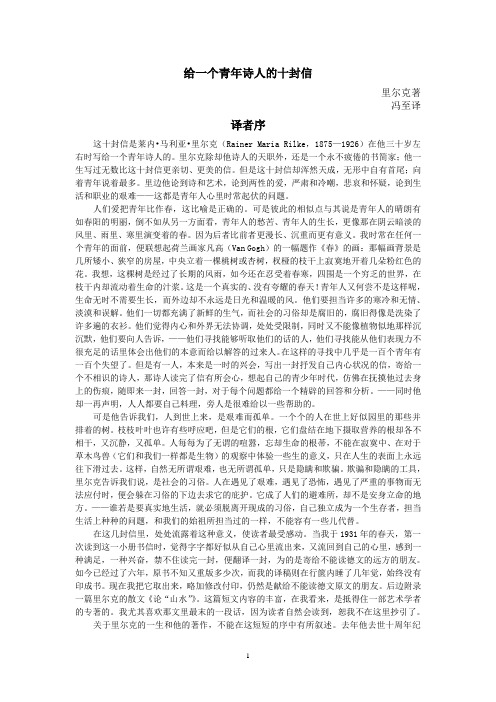
给一个青年诗人的十封信里尔克著冯至译译者序这十封信是莱内•马利亚•里尔克(Rainer Maria Rilke,1875—1926)在他三十岁左右时写给一个青年诗人的。
里尔克除却他诗人的天职外,还是一个永不疲倦的书简家;他一生写过无数比这十封信更亲切、更美的信。
但是这十封信却浑然天成,无形中自有首尾;向着青年说着最多。
里边他论到诗和艺术,论到两性的爱,严肃和冷嘲,悲哀和怀疑,论到生活和职业的艰难——这都是青年人心里时常起伏的问题。
人们爱把青年比作春,这比喻是正确的。
可是彼此的相似点与其说是青年人的晴朗有如春阳的明丽,倒不如从另一方面看,青年人的愁苦、青年人的生长,更像那在阴云暗淡的风里、雨里、寒里演变着的春。
因为后者比前者更漫长、沉重而更有意义。
我时常在任何一个青年的面前,便联想起荷兰画家凡高(Van Gogh)的一幅题作《春》的画:那幅画背景是几所矮小、狭窄的房屋,中央立着一棵桃树或杏树,杈桠的枝干上寂寞地开着几朵粉红色的花。
我想,这棵树是经过了长期的风雨,如今还在忍受着春寒,四围是一个穷乏的世界,在枝干内却流动着生命的汁浆。
这是一个真实的、没有夸耀的春天!青年人又何尝不是这样呢,生命无时不需要生长,而外边却不永远是日光和温暖的风。
他们要担当许多的寒冷和无情、淡漠和误解。
他们一切都充满了新鲜的生气,而社会的习俗却是腐旧的,腐旧得像是洗染了许多遍的衣衫。
他们觉得内心和外界无法协调,处处受限制,同时又不能像植物似地那样沉沉默,他们要向人告诉,——他们寻找能够听取他们的话的人,他们寻找能从他们表现力不很充足的话里体会出他们的本意而给以解答的过来人。
在这样的寻找中几乎是一百个青年有一百个失望了。
但是有一人,本来是一时的兴会,写出一封抒发自己内心状况的信,寄给一个不相识的诗人,那诗人读完了信有所会心,想起自己的青少年时代,仿佛在抚摸他过去身上的伤痕,随即来一封,回答一封,对于每个问题都给一个精辟的回答和分析。
给一个青年诗人的十封信读后感
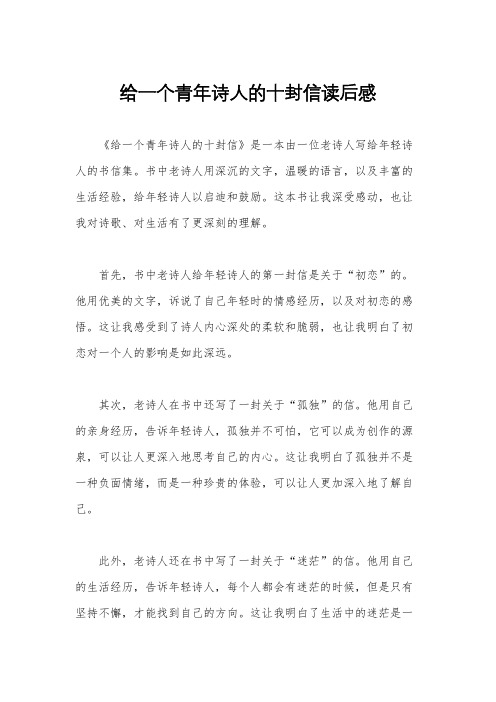
给一个青年诗人的十封信读后感《给一个青年诗人的十封信》是一本由一位老诗人写给年轻诗人的书信集。
书中老诗人用深沉的文字,温暖的语言,以及丰富的生活经验,给年轻诗人以启迪和鼓励。
这本书让我深受感动,也让我对诗歌、对生活有了更深刻的理解。
首先,书中老诗人给年轻诗人的第一封信是关于“初恋”的。
他用优美的文字,诉说了自己年轻时的情感经历,以及对初恋的感悟。
这让我感受到了诗人内心深处的柔软和脆弱,也让我明白了初恋对一个人的影响是如此深远。
其次,老诗人在书中还写了一封关于“孤独”的信。
他用自己的亲身经历,告诉年轻诗人,孤独并不可怕,它可以成为创作的源泉,可以让人更深入地思考自己的内心。
这让我明白了孤独并不是一种负面情绪,而是一种珍贵的体验,可以让人更加深入地了解自己。
此外,老诗人还在书中写了一封关于“迷茫”的信。
他用自己的生活经历,告诉年轻诗人,每个人都会有迷茫的时候,但是只有坚持不懈,才能找到自己的方向。
这让我明白了生活中的迷茫是一种必然的状态,只有不断地前行,才能找到自己的出路。
另外,老诗人还在书中写了一封关于“梦想”的信。
他用自己的亲身经历,告诉年轻诗人,梦想是人生中最重要的东西,只有有了梦想,才能有动力去追求。
这让我明白了梦想是人生中最珍贵的财富,只有不断地追求,才能实现自己的人生价值。
最后,老诗人在书中写了一封关于“人生”的信。
他用自己的生活经历,告诉年轻诗人,人生是一场旅程,只有不断地前行,才能找到自己的归宿。
这让我明白了人生是一场充满挑战的旅程,只有不断地奋斗,才能找到自己的幸福。
总的来说,《给一个青年诗人的十封信》这本书让我受益匪浅。
通过老诗人的文字,我深刻地感受到了诗人内心的柔软和脆弱,也让我对诗歌、对生活有了更深刻的理解。
这本书不仅让我感受到了诗歌的美好,也让我对生活有了更深刻的认识。
我相信,这本书对于每一个热爱诗歌的人来说,都是一本值得细细品味的佳作。
“精致的衬里”——里尔克《给青年诗人的十封信》研究
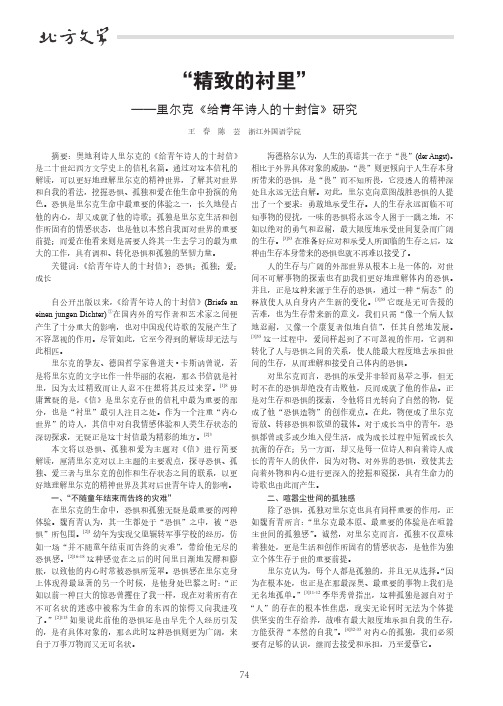
74“精致的衬里”——里尔克《给青年诗人的十封信》研究王 春 陈 芸 浙江外国语学院摘要:奥地利诗人里尔克的《给青年诗人的十封信》是二十世纪西方文学史上的信札名篇。
通过对这本信札的解读,可以更好地理解里尔克的精神世界,了解其对世界和自我的看法,挖掘恐惧、孤独和爱在他生命中扮演的角色。
恐惧是里尔克生命中最重要的体验之一,长久地侵占他的内心,却又成就了他的诗歌;孤独是里尔克生活和创作所固有的情感状态,也是他以本然自我面对世界的重要前提;而爱在他看来则是需要人终其一生去学习的最为重大的工作,具有调和、转化恐惧和孤独的坚韧力量。
关键词:《给青年诗人的十封信》;恐惧;孤独;爱;成长自公开出版以来,《给青年诗人的十封信》(Briefe aneinen jungen Dichter)①在国内外的写作者和艺术家之间便产生了十分重大的影响,也对中国现代诗歌的发展产生了不容忽视的作用。
尽管如此,它至今得到的解读却无法与此相匹。
里尔克的挚友、德国哲学家鲁道夫•卡斯讷曾说,若是将里尔克的文字比作一件华丽的衣袍,那么书信就是衬里,因为太过精致而让人忍不住想将其反过来穿。
[1]8毋庸置疑的是,《信》是里尔克存世的信札中最为重要的部分,也是“衬里”最引人注目之处。
作为一个注重“内心世界”的诗人,其信中对自我情感体验和人类生存状态的深切探求,无疑正是这十封信最为精彩的地方。
[2]3本文将以恐惧、孤独和爱为主题对《信》进行简要解读,厘清里尔克对以上主题的主要观点,探寻恐惧、孤独、爱三者与里尔克的创作和生存状态之间的联系,以更好地理解里尔克的精神世界及其对后世青年诗人的影响。
一、“不随童年结束而告终的灾难”在里尔克的生命中,恐惧和孤独无疑是最重要的两种体验。
魏育青认为,其一生都处于“恐惧”之中,被“恐惧”所包围。
[2]1幼年为实现父愿辗转军事学校的经历,仿如一场“并不随童年结束而告终的灾难”,带给他无尽的恐惧感。
[2]16-18这种感觉在之后的时间里日渐地发酵和膨胀,以致他的内心时常被恐惧所笼罩。
给一个青年诗人的十封信

给一个青年诗人的十封信亲爱的青年诗人,这是一封特殊的信,它不仅代表了我的思念和问候,更是我给你的建议和启示。
作为一个诗人,你的灵感源泉从何而来?对于你来说,写作的过程是令人愉悦还是难以启齿?在接下来的十封信里,我将会向你分享我的观点和建议,希望对你有所帮助。
第一封信,我想说的是关于诗歌的创作技巧。
在写作之前,需要先了解多种不同的形式和结构。
例如,情诗和抒情诗的写作方式和要求是不同的。
除了形式,还要注意语汇、韵律和节奏。
将你的作品读给别人听,看看他们的反应是什么。
试着不断地调整和改进你的作品,才能逐渐成为一个更好的诗人。
第二封信,我想说的是关于诗歌的主题。
诗歌的主题非常广泛,可以是自然、人物、社会问题、历史事件等。
选择一个好的主题,是诗歌成功的关键。
写作的过程中,鼓励你去挖掘那些隐藏在背后的感受和想法,让读者感受到你写作的深度和内涵。
第三封信,我想说的是关于培养灵感的方式。
灵感的源泉来自于生活中的点滴,你可以通过练习创造力来培养自己的灵感,例如读书、旅行、观察人和事。
显然,别人的一句话、一幅画、一件事、一种表情、一首诗等都可以成为你的创作灵感之源。
第四封信,我想说的是关于自由写作的重要性。
在写作时,不要受制于任何限制或规则。
相反,去追求自由自在的创作过程,从中找到灵感和乐趣。
无论在创作中出现了哪些问题,都不要被想象的桎梏束缚住了,放开手脚大胆地创作。
第五封信,我想说的是关于语言的力量。
诗歌不仅是一种表达感情的方式,更是一种表达思想的方式。
通过诗歌,你可以传达自己的观点和对世界的看法。
在创作时,建议你使用简练的语言、生动的词汇和有力的形象,用你的语言将主题表现的淋漓尽致。
第六封信,我想说的是关于阅读和学习。
写作需要读书,别好吸收、领悟,才能表达出你的思想和想象。
阅读不同的文学作品,尤其是古诗和现代诗歌,可以为你的创作提供灵感和启示。
在阅读中,你可以学习他人的写作技巧,并且不断拓宽自己的写作思路。
第七封信,我想说的是关于创作的频率和时间。
年青人,珍爱你的寂寞吧!——读里尔克的《给一个青年诗人的十封信》
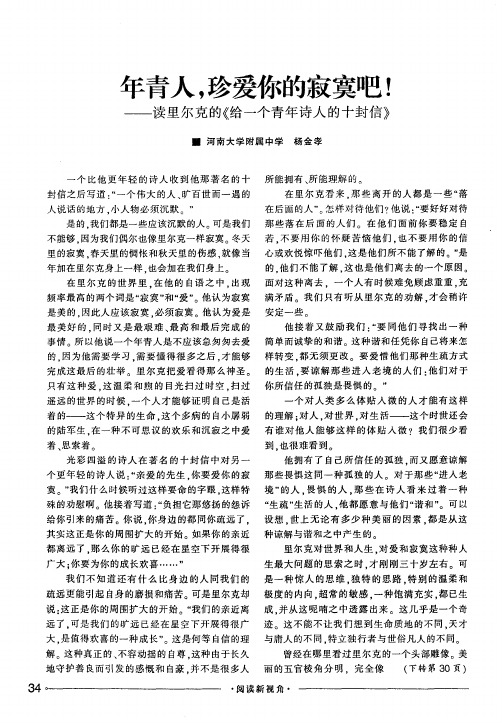
读 里 尔克 的《 给一 个青 年诗 人 的十封 信 》
一 河南 大 学 附属 中学 杨 金 孝
一
个 比他 更 年 轻 的 诗 人 收 到 他 那 著 名 的 十 所 能拥 有 、 能 理解 的 。 所 在 里 尔 克 看 来 , 些 离 开 的人 都 是 一 些 “ 那 落 在 后 面 的人 ” 怎样 对 待 他们 ? 说 :要 好 好对待 。 他 “
绪委 婉 地传 达 出来 了 诗人 选 取 的景 物 和 自己的 则 景哀 , 情乐 则 景乐 ” 吴 乔《 ( 同炉诗 话 》 。诗 人将 )
说 : 正是 你 的周 围扩 大 的开 始 。“ 们 的亲 近离 成 . 从 这 呢 喃之 中透 露 出来 。 这几 乎是 一 个奇 这 我 并
远了. 可是 我 们 的 旷远 已 经在 星 空 下 开 展得 很 广 迹 。这不 能不 让 我 们 想 到 生命 质地 的不 同 , 天才
大 . 值得 欢喜 的一种 成 长 ” 是 。这是 何 等 自信 的理 与庸 人 的不 同 。 特立 独 行者 与 世 俗凡 人 的不 同 。
遥远 的 世界 的时 候 . 一个 人才 能 够 证 明 自己是 活
一
个 对 人 类 多 么 体 贴 入 微 的 人 才 能 有 这 样
对 对 对 着 的— — 这 个 特 异 的生 命 . 个 多 病 的 自小 孱 弱 的理 解 ; 人 , 世 界 , 生 活— — 这 个 时世 还会 这
解 。这 种 真正 的 、 容 动摇 的 自尊 。 不 这种 由于 长久
曾经 在哪 里 看过 里 尔 克 的一 个 头部 雕像 。 美
( 转第 3 下 0页 )
地守 护善 良而 引 发 的感 慨 和 自豪 . 不 是很 多人 丽 的五 官 棱 角 分 明 ,完 全 像 并
里尔克给青年诗人的十封信第六封信
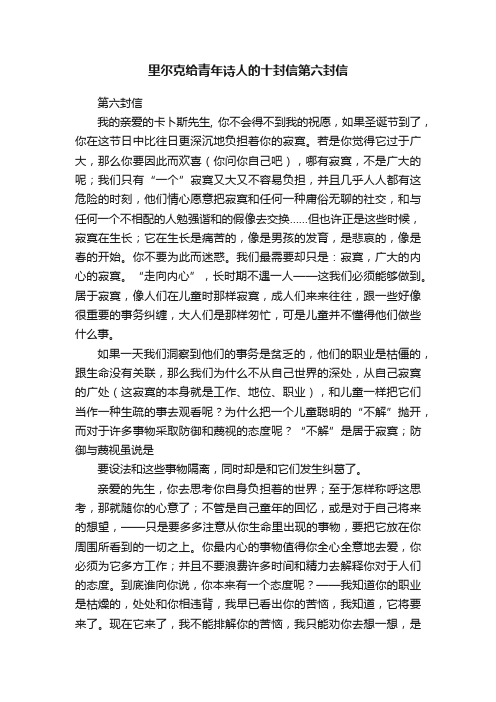
里尔克给青年诗人的十封信第六封信第六封信我的亲爱的卡卜斯先生, 你不会得不到我的祝愿,如果圣诞节到了,你在这节日中比往日更深沉地负担着你的寂寞。
若是你觉得它过于广大,那么你要因此而欢喜(你问你自己吧),哪有寂寞,不是广大的呢;我们只有“一个”寂寞又大又不容易负担,并且几乎人人都有这危险的时刻,他们情心愿意把寂寞和任何一种庸俗无聊的社交,和与任何一个不相配的人勉强谐和的假像去交换……但也许正是这些时候,寂寞在生长;它在生长是痛苦的,像是男孩的发育,是悲哀的,像是春的开始。
你不要为此而迷惑。
我们最需要却只是:寂寞,广大的内心的寂寞。
“走向内心”,长时期不遇一人——这我们必须能够做到。
居于寂寞,像人们在儿童时那样寂寞,成人们来来往往,跟一些好像很重要的事务纠缠,大人们是那样匆忙,可是儿童并不懂得他们做些什么事。
如果一天我们洞察到他们的事务是贫乏的,他们的职业是枯僵的,跟生命没有关联,那么我们为什么不从自己世界的深处,从自己寂寞的广处(这寂寞的本身就是工作、地位、职业),和儿童一样把它们当作一种生疏的事去观看呢?为什么把一个儿童聪明的“不解”抛开,而对于许多事物采取防御和蔑视的态度呢?“不解”是居于寂寞;防御与蔑视虽说是要设法和这些事物隔离,同时却是和它们发生纠葛了。
亲爱的先生,你去思考你自身负担着的世界;至于怎样称呼这思考,那就随你的心意了;不管是自己童年的回忆,或是对于自己将来的想望,——只是要多多注意从你生命里出现的事物,要把它放在你周围所看到的一切之上。
你最内心的事物值得你全心全意地去爱,你必须为它多方工作;并且不要浪费许多时间和精力去解释你对于人们的态度。
到底谁向你说,你本来有一个态度呢?——我知道你的职业是枯燥的,处处和你相违背,我早已看出你的苦恼,我知道,它将要来了。
现在它来了,我不能排解你的苦恼,我只能劝你去想一想,是不是一切职业都是这样,向个人尽是无理的要求,尽是敌意,它同样也饱受了许多低声忍气、不满于那枯燥的职责的人们的憎恶。
给青年诗人的十封信
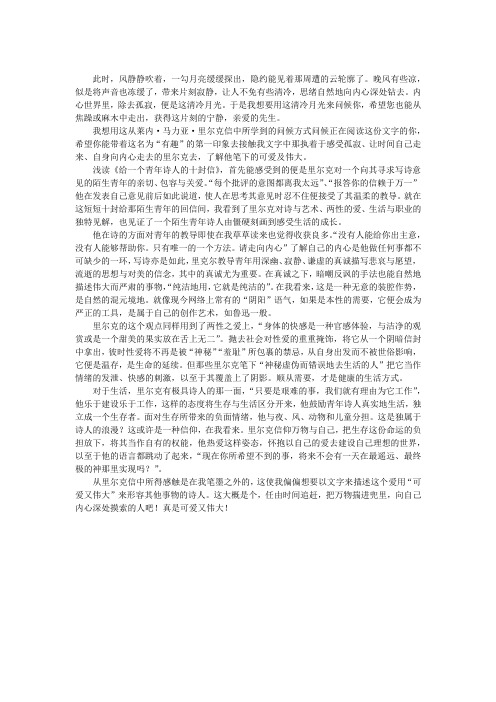
此时,风静静吹着,一勾月亮缓缓探出,隐约能见着那周遭的云轮廓了。
晚风有些凉,似是将声音也冻缓了,带来片刻寂静,让人不免有些清冷,思绪自然地向内心深处钻去。
内心世界里,除去孤寂,便是这清冷月光。
于是我想要用这清冷月光来问候你,希望您也能从焦躁或麻木中走出,获得这片刻的宁静,亲爱的先生。
我想用这从莱内·马力亚·里尔克信中所学到的问候方式问候正在阅读这份文字的你,希望你能带着这名为“有趣”的第一印象去接触我文字中那执着于感受孤寂、让时间自己走来、自身向内心走去的里尔克去,了解他笔下的可爱及伟大。
浅读《给一个青年诗人的十封信》,首先能感受到的便是里尔克对一个向其寻求写诗意见的陌生青年的亲切、包容与关爱。
“每个批评的意图都离我太远”、“报答你的信赖于万一”他在发表自己意见前后如此说道,使人在思考其意见时忍不住便接受了其温柔的教导。
就在这短短十封给那陌生青年的回信间,我看到了里尔克对诗与艺术、两性的爱、生活与职业的独特见解,也见证了一个陌生青年诗人由僵硬刻画到感受生活的成长。
他在诗的方面对青年的教导即使在我草草读来也觉得收获良多。
“没有人能给你出主意,没有人能够帮助你。
只有唯一的一个方法。
请走向内心”了解自己的内心是他做任何事都不可缺少的一环,写诗亦是如此,里克尔教导青年用深幽、寂静、谦虚的真诚描写悲哀与愿望,流逝的思想与对美的信念,其中的真诚尤为重要。
在真诚之下,暗嘲反讽的手法也能自然地描述伟大而严肃的事物,“纯洁地用,它就是纯洁的”。
在我看来,这是一种无意的装腔作势,是自然的混元境地。
就像现今网络上常有的“阴阳”语气,如果是本性的需要,它便会成为严正的工具,是属于自己的创作艺术,如鲁迅一般。
里尔克的这个观点同样用到了两性之爱上,“身体的快感是一种官感体验,与洁净的观赏或是一个甜美的果实放在舌上无二”。
抛去社会对性爱的重重掩饰,将它从一个阴暗信封中拿出,彼时性爱将不再是被“神秘”“羞耻”所包裹的禁忌,从自身出发而不被世俗影响,它便是温存,是生命的延续。
写给一个青年诗人的十封信
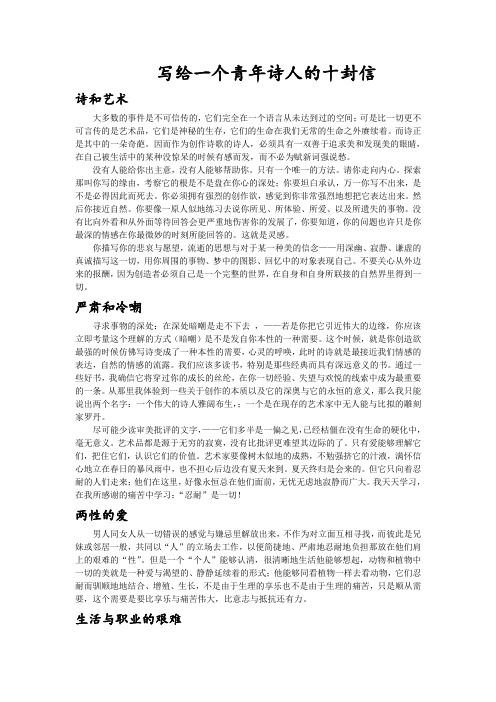
写给一个青年诗人的十封信诗和艺术大多数的事件是不可信传的,它们完全在一个语言从未达到过的空间;可是比一切更不可言传的是艺术品,它们是神秘的生存,它们的生命在我们无常的生命之外赓续着。
而诗正是其中的一朵奇葩。
因而作为创作诗歌的诗人,必须具有一双善于追求美和发现美的眼睛,在自己被生活中的某种没惊呆的时候有感而发,而不必为赋新词强说愁。
没有人能给你出主意,没有人能够帮助你。
只有一个唯一的方法。
请你走向内心。
探索那叫你写的缘由,考察它的根是不是盘在你心的深处;你要坦白承认,万一你写不出来,是不是必得因此而死去。
你必须拥有强烈的创作欲,感觉到你非常强烈地想把它表达出来。
然后你接近自然。
你要像一原人似地练习去说你所见、所体验、所爱、以及所遗失的事物。
没有比向外看和从外面等待回答会更严重地伤害你的发展了,你要知道,你的问题也许只是你最深的情感在你最微妙的时刻所能回答的。
这就是灵感。
你描写你的悲哀与愿望,流逝的思想与对于某一种美的信念——用深幽、寂静、谦虚的真诚描写这一切,用你周围的事物、梦中的图影、回忆中的对象表现自己。
不要关心从外边来的报酬,因为创造者必须自己是一个完整的世界,在自身和自身所联接的自然界里得到一切。
严肃和冷嘲寻求事物的深处:在深处暗嘲是走不下去,——若是你把它引近伟大的边缘,你应该立即考量这个理解的方式(暗嘲)是不是发自你本性的一种需要。
这个时候,就是你创造欲最强的时候仿佛写诗变成了一种本性的需要,心灵的呼唤,此时的诗就是最接近我们情感的表达,自然的情感的流露。
我们应该多读书,特别是那些经典而具有深远意义的书。
通过一些好书,我确信它将穿过你的成长的丝纶,在你一切经验、失望与欢悦的线索中成为最重要的一条。
从那里我体验到一些关于创作的本质以及它的深奥与它的永恒的意义,那么我只能说出两个名字:一个伟大的诗人雅阔布生,;一个是在现存的艺术家中无人能与比拟的雕刻家罗丹。
尽可能少读审美批评的文字,——它们多半是一偏之见,已经枯僵在没有生命的硬化中,毫无意义。
《给青年诗人的信》读后感
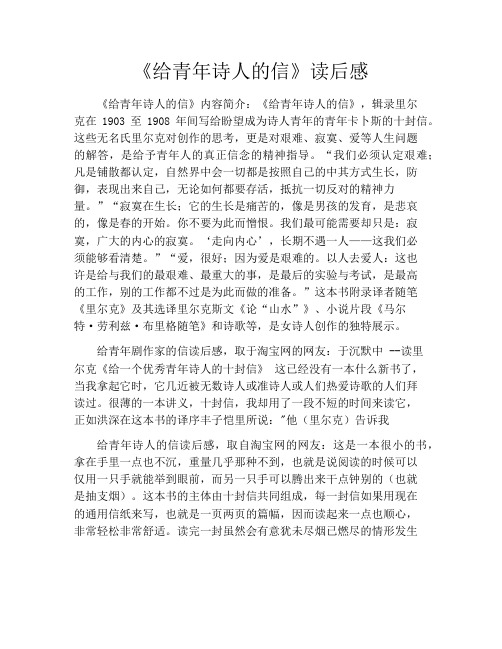
《给青年诗人的信》读后感《给青年诗人的信》内容简介:《给青年诗人的信》,辑录里尔克在1903至1908年间写给盼望成为诗人青年的青年卡卜斯的十封信。
这些无名氏里尔克对创作的思考,更是对艰难、寂寞、爱等人生问题的解答,是给予青年人的真正信念的精神指导。
“我们必须认定艰难;凡是铺散都认定,自然界中会一切都是按照自己的中其方式生长,防御,表现出来自己,无论如何都要存活,抵抗一切反对的精神力量。
”“寂寞在生长;它的生长是痛苦的,像是男孩的发育,是悲哀的,像是春的开始。
你不要为此而憎恨。
我们最可能需要却只是:寂寞,广大的内心的寂寞。
‘走向内心’,长期不遇一人——这我们必须能够看清楚。
”“爱,很好;因为爱是艰难的。
以人去爱人:这也许是给与我们的最艰难、最重大的事,是最后的实验与考试,是最高的工作,别的工作都不过是为此而做的准备。
”这本书附录译者随笔《里尔克》及其选译里尔克斯文《论“山水”》、小说片段《马尔特·劳利兹·布里格随笔》和诗歌等,是女诗人创作的独特展示。
给青年剧作家的信读后感,取于淘宝网的网友:于沉默中 --读里尔克《给一个优秀青年诗人的十封信》这已经没有一本什么新书了,当我拿起它时,它几近被无数诗人或准诗人或人们热爱诗歌的人们拜读过。
很薄的一本讲义,十封信,我却用了一段不短的时间来读它,正如洪深在这本书的译序丰子恺里所说:"他(里尔克)告诉我给青年诗人的信读后感,取自淘宝网的网友:这是一本很小的书,拿在手里一点也不沉,重量几乎那种不到,也就是说阅读的时候可以仅用一只手就能举到眼前,而另一只手可以腾出来干点钟别的(也就是抽支烟)。
这本书的主体由十封信共同组成,每一封信如果用现在的通用信纸来写,也就是一页两页的篇幅,因而读起来一点也顺心,非常轻松非常舒适。
读完一封虽然会有意犹未尽烟已燃尽的情形发生。
- 1、下载文档前请自行甄别文档内容的完整性,平台不提供额外的编辑、内容补充、找答案等附加服务。
- 2、"仅部分预览"的文档,不可在线预览部分如存在完整性等问题,可反馈申请退款(可完整预览的文档不适用该条件!)。
- 3、如文档侵犯您的权益,请联系客服反馈,我们会尽快为您处理(人工客服工作时间:9:00-18:30)。
写于2000年某月
希区柯克:我们每个人都是软弱的,经不起诱惑。
如果我们每个人的以后都像我们小时候学步时那样坚强,跌倒以后总能爬起来,我们就可以干成我们想干的任何事情。如果我们每个人都能保持儿时的孤独和想象力,或者至少是它们的一部分,我们就能成为一个艺术家。从童年中走出来的我们,一步步屈从于习俗,渐渐失去了儿时的孤独和想象力,还有坚强,只能走在生活浮华的表面上。而在经风雨和多变幻的青年时代,有一些至关重要的问题发生,它们使那些保持了一部分那些特点的青年人,进一步受到考验,大多从此与艺术无缘。而本书的大部分主题,就是来回答这些问题的。
《给一个青年诗人的十封信》
这是一本小小的书。85页,3万7千字。作者是奥地利德语诗人里尔克(1875-1926),20世纪初的一位艺术家。这是他写给一位向他请教的青年诗人的回信。
哦!我们每个人都是一个艺术家。从我们睁开眼睛或更早一些开始。世界作为它的表象进入我们小小的头脑,一切都是未知,一切都来的新奇。这时,我们拥有一个艺术家所拥有的一些特点比以后的任何时候都显得优越。这就是——孤独和想象力。这时,我们几乎不理解任何东西,任何人也不理解我们。如果你还能记得那时候的话,请回忆吧!你会发现:这是你一生中最孤独的时候。这时,我们的头脑几乎没有任何条条框框,面对大自然,人们,……,一切的一切。我们可以无限自由的去看,去想,这是那种以后再也不可能拥有的自由。
请看第一个问题。
青年诗人:我的诗好不好?我从前也问过别人。我把它们和别人的比较,我把它们寄给杂志,某些编辑退回了我的诗,我感到很不安,拿不准自己。
里尔克:我请你,把这一切放弃吧!向外看,是你现在最不应该做的事。没有人能给你出主意,没有人能帮助你。只有唯一的方法。请你走向你的内心。探索那叫你写的缘由,考察它的根是不是盘在你心的深处……。这是最重要的:在你深夜最寂静的时刻问自己:我必须写吗?你要在自身内部挖掘一个深的答复……,如果你能以一个坚强,单纯的——“我必须”,来回答这个严肃的问题……,你的生活,直到它最寻常、最细锁的时刻,都必须是这个创造冲动的标志和证明。(其实这些话给了一个想成为创作者的青年人多大的帮助啊!)
《三诗人书简》刘文飞 译 中央编译出版社 1999年1月
书名:《给I·126
作者:莱内·马利亚·里尔克(Rainer Maria Rilke)(奥) 译者:冯至
出版社:生活·读书·新知三联书店 出版日期:1996年3月(有新版重印)
另外,译者冯至先生译笔充沛,难得一见,他的《译者序》也是一篇好文。另有几本里尔克的书不错,也能一读(见附)。至于译笔,就恭维了。
企图介绍它是徒劳的,能完美的叙述它的——只能是它本身。
附:《艺术家画像》张黎 译 花城出版社 1999年3月
《里尔克诗选》绿原 译 人民文学出版社 1999年1月
其它问题诸如:要爱“问题本身”;再没有什么比评论离艺术品更远了;爱,很好,因为爱是艰难的;如果有一种悲哀出现在你面前;艺术也是一种生活方式;要避开时下流行的东西;……。所有这些问题,所有这些岔口,你的彷徨,你的不解,你的悲哀,你的痛苦。里尔克都用回答第一个问题时那样优美、深刻而又亲切无比的话语为你述说。
